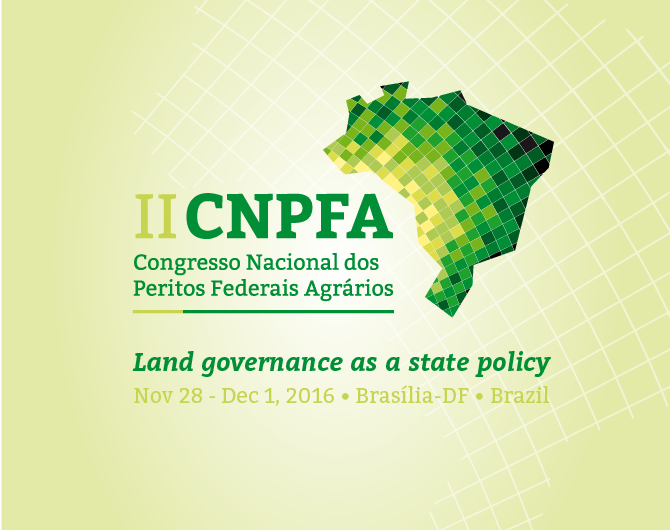
The second edition of the National Congress of Federal Agrarians Experts – II CNPFA aims to discuss – in a technical, environmental and social basis – the management of land use in Brazil as a State”s priority policy, highlighting the role of the Federal Agrarians Experts (PFAs) and their participation in an effective agrarian governance.
Land governance is known as the set of rules and processes, besides the level of organization and institutions which determines the access and the use of land in a country. It involves State”s policies, laws, regulations, programs, institutions and organizational relationships, as well as the personnel amount and the availability of reliable and accessible land use information systems, allied to the government”s ability to implement these policies.
Therefore, an entire institutional order, associated with the agrarian reality of a country, is recognized as land governance. Also, the system must be designed to support a program that meets the needs of the less fortunate, recognizing property rights”, and some times, guarantee unofficial customary rights, seeking to generate security for land”s squatters.
The Judgment nº. 1942/2015 from the Court of Audit (TCU), points out that the Brazilian State has inaccurate data about its territory”s occupation, making it difficult to establish specific policies and do it so properly. Also according to the TCU, the high number of several institutional actors, dispersed and without integrated operations, all them having direct and indirect interface with land governance, combined with the large amount of scattered legislation affecting this subject, mostly outdated and sometimes conflicting, intensify the problems, resulting in inefficient agrarian governance.
This reality requires the adoption of urgent measures aiming an integration, not only of these institutions, but also the fragmented set of rules and laws.
In this sense, the “Carta de Brasilia”, a public manifest which resulted from the Land Governance Conference, sponsored by the TCU itself, held between 25 and 27 March 2015, mentions that “the lack of reviewing and consolidation of the rules that regulates the organization of its own territory, the access to land resources, the right of rural land ownership and the actions to promote sustainable use of soil and water generate gaps, overlaps and other inefficiencies. In addition, all this make it difficult establishing a good administration of territorial organization and access to agrarian resources.”
At the same time, social and economic demand increases changing the country side agenda. Brings issues little debated before into the focus, requiring other products, new services and values needed to agricultural production such as alternative energy sources; environmental services; soil and water sources conservation; preservation of native vegetation for maintaining the biodiversity; provide social conditions for keeping the traditional communities, like the “Quilombolas”; avoid climate changes and promote the reduction of the regional development differences. It”s, in fact, a new concept of multifunctionality in rural areas.
Answering the different social demands and interest groups involved in rural areas requires from the Brazilian State action in the regulation of land use and ownership and to promote economic development with sustainability facing the new demands in global consumption values, newer international legislation in the use of natural resources and climate changes goals characterizes the essence of the new agenda for rural development.
Establishing the required governance to fulfill different roles in a potentially conflicting use of rural properties – in a context where countries defend the principles of free trade and, at the same time, practice protectionism according to their political and economic convenience – is, in our point of view, the new Agrarian Question of the XXI century.
The promotion of sustainable development requires effective land governance that, to make it viable requires the establishment of territorial planning tools make the land market monitoring, to document and regulate land use and your property.
Consequently, an integrated and strengthened State Autarchy (or Agency) is necessary to articulate the various institutions responsible for land administration in the country side, aiming the sustainable use of soil, water and biodiversity, besides the access for farming and, therefore, food security.
This new institutional order should act in the whole national territory, being present in all Brazilian States. It needs to integrate the properties registration with the geospatial information”s systems from other institutions and public agencies to produce qualified information of the Brazilians properties countryside”s data.
The Federal Agrarians Experts have a clear view of the problem”s scale and argue that land governance is strategic for the country”s development. Given to their expertise, training and performance, these professionals have an important contribution to make in the creation process of this new institutionality.
Therefore, the II CNPFA intends to share with the international community the discussion subjects in the following areas:
a) Challenges for land governance in Brazil;
b) The Institutional model necessary for an efficient land governance as a State Policy; and
c) Policies for the career and professional development of the Federal Agrarians Experts.
With the achievement of the second edition of our Congress we expect to have a better understanding on the proposed themes in order to strengthen our political intervention; in coordination with other entities, intellectuals, representatives of other institutions related servers to the subject.
This is an essential condition in the struggle for strengthening public policies for land governance and the building of a new institutional order in favor of Brazilian society and the professional development of Federal Agrarians Experts with their inclusion in the agendas of land governance policies, besides the rational natural resources use and sustainable rural development.
Organizing Committee of the II CNPFA: cnpfa@sindpfa.org.br
+55 (61) 3327-1210





